|
|
||
 |
||
| La libido réactionnaire?: the recent fiction of J.G. Ballard By Benjamin Noys Lecturer in English, the University of Chichester This essay was originally published by Sage Publishers in 2007, and it is reprinted here without permission. An analysis of this essay, written by Simon Sellars, can be found at Ballardian.  Abstract: Abstract:This essay addresses the question of whether the contemporary British writer J.G. Ballard is reactionary. It uses the work of the psychoanalytic thinker Slavoj Zizek to analyse the ways in which his recent fiction, the novels Cocaine Nights (1996), Super-Cannes (2000), Millennium People (2003), and Kingdom Come (2006), poses disturbing questions concerning order, community and transgression within contemporary capitalist society. The analysis traces the shifting and ambiguous political effects of Ballard’s attempts to provide warnings concerning emergent cultural pathologies. This leads to an examination of how Ballard puts the generic conventions of contemporary fiction under pressure by his subversion of the crime / thriller novel. The conclusion focuses on the relative lack of controversy aroused by Ballard’s provocative fiction in Britain. If anywhere, the future seems to lie with competing systems of psychopathology -- J G Ballard (2005: 29)  Is J.G. Ballard a reactionary? The politics of this contemporary British writer have caused puzzlement to critics, to the point where John Gray remarked that ‘Ballard’s achievement is not to have staked out any kind of political position’ (1999). I want to take up the question in the light of the New Reactionaries controversy in France. Daniel Lindenberg’s original ‘call to order’ warning singled out writers of fiction, such as Michel Houellebecq and Maurice G. Dantec, as ‘New Reactionaries’ – hostile to liberal democracy and the liberal cultural consensus. Lindenberg’s claim that taboo-lifting radical writing might release a ‘reactionary libido’ (2002: 11) bears consideration, despite his reductive treatment of fictional texts. Certainly it renders debatable the common assumption that counter-cultural radicalism should automatically be located on the ‘left’, when that is loosely defined as challenging the status quo in the name of radical democratic values. In fact a number of recent controversies around transgressive gestures by artists, novelists, historians and academics, such as the debates over ‘political correctness’, suggest how such gestures can serve the agenda of the right. The recent fiction of Ballard offers an opportunity to analyse a parallel case in Britain. Is J.G. Ballard a reactionary? The politics of this contemporary British writer have caused puzzlement to critics, to the point where John Gray remarked that ‘Ballard’s achievement is not to have staked out any kind of political position’ (1999). I want to take up the question in the light of the New Reactionaries controversy in France. Daniel Lindenberg’s original ‘call to order’ warning singled out writers of fiction, such as Michel Houellebecq and Maurice G. Dantec, as ‘New Reactionaries’ – hostile to liberal democracy and the liberal cultural consensus. Lindenberg’s claim that taboo-lifting radical writing might release a ‘reactionary libido’ (2002: 11) bears consideration, despite his reductive treatment of fictional texts. Certainly it renders debatable the common assumption that counter-cultural radicalism should automatically be located on the ‘left’, when that is loosely defined as challenging the status quo in the name of radical democratic values. In fact a number of recent controversies around transgressive gestures by artists, novelists, historians and academics, such as the debates over ‘political correctness’, suggest how such gestures can serve the agenda of the right. The recent fiction of Ballard offers an opportunity to analyse a parallel case in Britain.Like the French novelists that Lindenberg focuses on, Ballard operates on the borders of genre fiction to create disturbing anti-bourgeois novels. He began as a writer of science fiction and his early novels, such as The Drowned World (1962), were influenced by John Wyndham’s explorations of environmental catastrophe. Already his writing showed distinctive experimental tendencies, particularly in the probing of the ‘inner space’ of the psyche. This tendency culminated in The Atrocity Exhibition (1970), and one of his best-known novels Crash (1973) (later to be made into an equally controversial film by David Cronenberg). In these works Ballard used the forensic prose of science to analyse the dominance of media culture and new forms of cultural pathology. In 1984 he published the autobiographical novel The Empire of the Sun that demonstrated how many of his distinctive themes and obsessions – nuclear catastrophe, deserted landscapes, enclosed micro-communities – drew directly on his wartime experiences. In particular Ballard’s description of his internment in Lunghua camp by the Japanese seemed to provide the key ‘primal scene’ for his repeated probing of the violent underside of bourgeois culture. These same obsessions have remained in his more recent fiction, despite his movement away from science fiction to the generic form of the thriller or crime fiction. The novels Cocaine Nights (1996), Super-Cannes (2000) Millennium People (2003), and Kingdom Come (2006) form a quartet in terms of structure and form, as each offers a variation on the fundamental problem of ‘reactionary libido’ as an everyday feature of contemporary bourgeois culture. 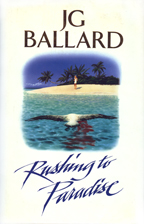 Why should this lead to Ballard being identified as a reactionary? A prima facie case can be made if we consider his earlier novel Rushing to Paradise (1994), which begins as a none-too subtle satire of radical environmentalism. It concerns the efforts of Dr Barbara Rafferty, a forty-year old green campaigner, to save the albatross on the Pacific island of Saint-Esprit. She is one of a number of obsessive and sinister medical figures that litter Ballard’s fiction. From the start of the novel she is represented as a vain, self-punishing, and potentially dangerous, ascetic. The sixteen year-old narrator Neil Dempsey, a transparent authorial surrogate, states ‘[i]f Saint Esprit, …, failed to match her expectations it would have to reshape itself into the threatened paradise for which she campaigned so tirelessly’ (Ballard, 1995: 10). In fact the environmental campaigners she brings to the island damage it and eat the animals they are supposed to be protecting. Slowly it emerges that Dr Rafferty has her own hidden agenda. She cuts the island off from contact with the outside world and disposes of the men with the ambition of creating a sanctuary for what she regards as the real endangered species, women. With her dreams of ‘all-women cities’ Dr Rafferty becomes a murderous parody of radical separatist feminism. Eventually she will also try to kill all the women on the island for their ‘weakness’ before turning on the albatross. Although the novel makes clear the distance of Dr Rafferty’s deranged logic from that of existing environmentalists, it also makes clear that political idealism is only a mask ‘for the cruel and dangerous strengths that no humane order could tolerate’ (Ballard, 1995: 238). Why should this lead to Ballard being identified as a reactionary? A prima facie case can be made if we consider his earlier novel Rushing to Paradise (1994), which begins as a none-too subtle satire of radical environmentalism. It concerns the efforts of Dr Barbara Rafferty, a forty-year old green campaigner, to save the albatross on the Pacific island of Saint-Esprit. She is one of a number of obsessive and sinister medical figures that litter Ballard’s fiction. From the start of the novel she is represented as a vain, self-punishing, and potentially dangerous, ascetic. The sixteen year-old narrator Neil Dempsey, a transparent authorial surrogate, states ‘[i]f Saint Esprit, …, failed to match her expectations it would have to reshape itself into the threatened paradise for which she campaigned so tirelessly’ (Ballard, 1995: 10). In fact the environmental campaigners she brings to the island damage it and eat the animals they are supposed to be protecting. Slowly it emerges that Dr Rafferty has her own hidden agenda. She cuts the island off from contact with the outside world and disposes of the men with the ambition of creating a sanctuary for what she regards as the real endangered species, women. With her dreams of ‘all-women cities’ Dr Rafferty becomes a murderous parody of radical separatist feminism. Eventually she will also try to kill all the women on the island for their ‘weakness’ before turning on the albatross. Although the novel makes clear the distance of Dr Rafferty’s deranged logic from that of existing environmentalists, it also makes clear that political idealism is only a mask ‘for the cruel and dangerous strengths that no humane order could tolerate’ (Ballard, 1995: 238).Ballard’s demolition of this deluded political idealism would seem parallel to the ‘new reactionary’ critiques of the sexual and political liberation movements of the 1960s and 1970s, with equally ambiguous results. But Michael Delville has argued that Rushing to Paradise should not be mistaken for ‘(merely) a satire on extremist tendencies in either animal-rights activism or feminism’ but considered in its ‘allegorical dimension’ (1998: 80). He suggests that the novel’s exploration of typical Ballardian themes means that we should not be preoccupied with the ‘surface’ aspects of the clumsy political satire. This, however, fails to answer the question why Ballard should choose to satirise causes that are associated with the left and the radical movements of the 1960s. The choice to read Ballard in allegorical terms appears somewhat evasive of the troubling political implications of this satirical gesture, which mocks radical movements and, at the same time, evinces a certain fascination for the charismatic authority of the ‘extremist’ leader. [1] So, while this novel does deal with the common Ballard theme of ‘small groups of psychologically isolated individuals in extreme situations’ (Delville, 1998: 81), it is just this theme that also bears further examination in political terms, especially when it concerns the revelation of ‘cruel and dangerous strengths’. To make this examination I want to turn to the work of Slavoj Zizek. For Zizek communities, up to and including nations, are not bound together so much by the public Law or their constitutions but by their ‘obscene unwritten rules’ (2002a: 29). Drawing on Freud’s concept of the super-ego (as the introjection of authority) he argues this authority is supported by the injunction to ‘Enjoy’. Zizek writes of the overlapping of the ‘duty of enjoyment’ with the ‘enjoyment of duty’ as the ‘zone’ of the superego (2002b: 129). We might think of the statement with which parents or authority figures accompany corporal punishment: ‘this will hurt me more than it does you’. Not only is it manifestly untrue, it also conceals the enjoyment being felt in carrying out this punishment in the name of the law. This enjoyment is not merely a kind of ‘perverse’ side-effect but absolutely essential to the function of law, as Zizek emphasizes: ‘it is not merely a secondary “safety valve,” but an active support of the public Law – not a tolerated pseudo-excess, but a solicited excess’ (2005a: 221;Zizek’s italics). It is possible to identify with Zizek, schematically it is true, three possible relations to the ‘obscene underside’ of the law, which also characterise major political positions. The first is liberal disavowal, which can be expressed by the Freudian formula of disavowal: ‘I know very well … but all the same’. That is, I know very well that these practices take place but all the same they are not really important. This is best captured by the ‘bad apples’ theory as it has been applied to accusations of corruption and racism in British policing. It suggests that these ‘abuses’ are the work of a ‘few bad apples’ who will spoil the barrel unless removed. Once they are removed then all is put right; that is the institution functions properly but is vulnerable to abuse. This defence was a common one, not least by the police themselves. It broke down after the Macpherson report into the investigation of the racist murder of Stephen Lawrence in 1993. The report, published in 1999, found evidence of systematic racism in the London Metropolitan Police and suggested that abuse was the rule and not the exception. Here we can see how the obscene underside is not a correctable failure of authority but its active and solicited support. The second position is one of right-wing identification with the obscene underside. As Zizek states it consists of ‘the properly Rightist admiration for the celebration of heroes who are ready to do the necessary dirty work’ (2002a: 30). In this case there is identification with the obscene underside of the law, which is seen as a necessary, if unfortunate, requirement for the protection of the freedoms of the majority. This argument is made in its most memorable form by Jack Nicholson’s character Colonel Nathan Jessep in the film A Few Good Men (1992) (see Zizek, 2006: 88). In a courtroom speech he defends the violent ‘code’ of the Marines, which has led to the murder of a soldier who was seen as incompetent. He argues that the defence of freedoms requires this violent code, saying to the liberal defence lawyer played by Tom Cruise ‘You can’t handle the truth’. The ‘truth’ being that liberal freedoms require illiberal acts to protect them, which liberals prefer not to know about. In this case the obscene underside is accepted but left, fundamentally, intact. The third position, endorsed by Zizek, is the left-wing relation that also takes-up the obscene underside but only to re-articulate its ideological coordinates. A working left-wing politics is not simply a matter of altering the public law. It must also act on the unwritten obscene law that really binds the community together. In his recent work one strategy that Zizek suggests is that this re-articulation be carried out through a radical ‘Act’ that touches on this concealed enjoyment. This ‘Act’ is often described in terms of an act that strikes against our own self, a radically self-destructive act that ruptures the usual enjoyment of the obscene underside of the law. The other element of the act is that it too must bring out the obscene underside but only to direct this enjoyment to new egalitarian ends. A left politics that does not engage with the obscene underside is doomed to ineffectiveness. 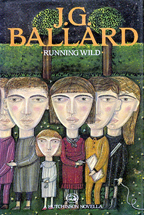 Independently Ballard’s fiction has drawn attention to this obscene underside of the law in very similar terms. Therefore we are not imposing a theoretical master-key to ‘unlock’ Ballard’s recent fiction. Instead we are tracing a parallel recognition and attempted exploration of possible solutions. In works like High Rise (1975) and Running Wild (1987) Ballard portrayed the new emerging enclosed micro-communities of the managerial class and the disruption of these communities by inexplicable acts of explosive violence. The investigations into these events reveal that they are a reaction to the sterility and hyper-conformity of these protected enclaves. Rather than being protests against economic immiseration they are protests against psychic immiseration. If the ‘everyday’ discontents of civilization are eliminated Ballard prophesies that the response will be psychotic violence, as the only path back to ‘a more brutal and more real world of the senses’ (Ballard, 1988: 46). His conclusion is, as the narrator puts it in Running Wild, that ‘[i]n a totally sane society, madness is the only freedom’ (1988: 56). Independently Ballard’s fiction has drawn attention to this obscene underside of the law in very similar terms. Therefore we are not imposing a theoretical master-key to ‘unlock’ Ballard’s recent fiction. Instead we are tracing a parallel recognition and attempted exploration of possible solutions. In works like High Rise (1975) and Running Wild (1987) Ballard portrayed the new emerging enclosed micro-communities of the managerial class and the disruption of these communities by inexplicable acts of explosive violence. The investigations into these events reveal that they are a reaction to the sterility and hyper-conformity of these protected enclaves. Rather than being protests against economic immiseration they are protests against psychic immiseration. If the ‘everyday’ discontents of civilization are eliminated Ballard prophesies that the response will be psychotic violence, as the only path back to ‘a more brutal and more real world of the senses’ (Ballard, 1988: 46). His conclusion is, as the narrator puts it in Running Wild, that ‘[i]n a totally sane society, madness is the only freedom’ (1988: 56).The twist that comes in his recent fiction is that those responsible for the psychological health of these communities have now realised the danger of this hyper-conformity. Faced with the risk of explosive violence they set out to provide their executive clients with the ‘safe’ release of violence through socially tolerated illegality, a kind of therapy through crime. Of course this is not a true freedom of the kind Ballard previously sought but merely the administered freedom of the obscene underside of enjoyment. The question then is what attitude does his fiction take to this enjoyment? If the previous release of explosive violence has been blocked or channelled then we face a situation in which it appears to be impossible to escape the constraints of consumer capitalism with traditional means. Therefore I want to trace chronologically the way in which Ballard’s recent fiction plays with the different permutations of this problem, which accounts, in part, for the sense of repetition and similarity between them. Using a common structure, and often interchangeable characters, the development of these narratives from one novel to the next probes different means for reading the controlled pathologies of contemporary capitalism, and for the diminishing possibilities for escaping them. 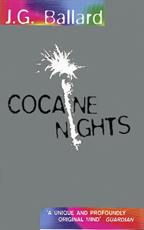 The first novel in this sequence, Cocaine Nights, concerns the investigation by Charles Prentice into the murder by arson of five people on the Costa del Sol and his brother Frank’s confession to this a crime. Frank had worked as a manager at the residential retreat of Estrella de Mar, and Charles uncovers the fact that this is no sleepy retirement complex but a ‘true community’ (1997a: 66) with a thriving cultural life. This cultural life, however, depends on a systematically organised ‘bureaucracy of crime’ involving prostitution, pornography, drug dealing, petty theft and vandalism orchestrated by Bobby Crawford, the complex’s tennis professional. From his previous military experience in the Far East (an echo of Ballard’s wartime trauma) Crawford has recognised the necessity of crime for galvanising a community. Charles himself is fascinated by Crawford and joins in his scheme for ‘waking up’ the new enclosed communities that have sprung up around the world. As Charles states ‘[e]verywhere you look – Britain, the States, western Europe – people are sealing themselves off into crime-free enclaves. That’s a mistake – a certain level of crime is part of the necessary roughage of life. Total security is a disease of deprivation’ (1997a: 293). The first novel in this sequence, Cocaine Nights, concerns the investigation by Charles Prentice into the murder by arson of five people on the Costa del Sol and his brother Frank’s confession to this a crime. Frank had worked as a manager at the residential retreat of Estrella de Mar, and Charles uncovers the fact that this is no sleepy retirement complex but a ‘true community’ (1997a: 66) with a thriving cultural life. This cultural life, however, depends on a systematically organised ‘bureaucracy of crime’ involving prostitution, pornography, drug dealing, petty theft and vandalism orchestrated by Bobby Crawford, the complex’s tennis professional. From his previous military experience in the Far East (an echo of Ballard’s wartime trauma) Crawford has recognised the necessity of crime for galvanising a community. Charles himself is fascinated by Crawford and joins in his scheme for ‘waking up’ the new enclosed communities that have sprung up around the world. As Charles states ‘[e]verywhere you look – Britain, the States, western Europe – people are sealing themselves off into crime-free enclaves. That’s a mistake – a certain level of crime is part of the necessary roughage of life. Total security is a disease of deprivation’ (1997a: 293).The novel appears then to endorse the regime of organised transgression as a preferable alternative to the stultifying effects of bourgeois conformity. In this way it appears to conform to the position identified by Zizek as the ‘Rightist’ admiration for those willing to do the dirty work. The novel is, of course, a satire but, as with Rushing to Paradise, it tips-over in its fascination for Bobby Crawford as the perverse the figure of authority – the psychopath as saint. The danger of such a fascination is that it merely endorses the status quo as always requiring a dirty obscene underside without probing how that privileges the social elite with the right to invent new psychopathologies practiced on the socially vulnerable, in a kind of postmodern droit de seigneur. What is notable is how Ballard’s next novel Super-Cannes addresses just this problem, offering a far more critical response to the possibilities of social experimentation in managed crime. The plot structure is very similar. In this case Paul Sinclair, an aviation journalist, arrives with his young doctor wife Jane at the new business complex of Eden-Olympia on the Côte d’Azur. Jane’s role is to replace the previous incumbent at the medical centre David Greenwood, who went on a gun rampage before committing suicide. The couple are housed in Greenwood’s old villa and soon Paul starts to conduct his own investigation into the massacre as he becomes haunted by the fate of his shadowy precursor. If Paul takes a similar role to Charles Prentice in Cocaine Nights the sinister psychiatrist Wilder Penrose takes the Bobby Crawford role. Like Crawford he is also running a secret therapy programme in crime, ‘a controlled and supervised madness’ (2001: 251) as he puts it. This programme takes a more directly reactionary form, with the executives making raids (ratissages) against the local Arabs and blacks and also organising a child-prostitution ring at a nearby clinic, originally run by David Greenwood. It will be revealed that it was his guilt at these activities, as well as at his own paedophilic desires, which drove Greenwood to commit the massacre – trying to finally expose those who were protected by their wealth and political connections. If the violence in Cocaine Nights tends to be playful, and focused within the community, Super-Cannes makes the more convincing case that this socially-sanctioned violence will actually run along existing lines of class and racial stratification. The residents of Eden-Olympia ‘punish’ the minority local communities in the full-knowledge that a blind-eye will be turned to their ‘raids’, which are in fact actually supported by Far Right politicians. In this way they get to release their own madness but only outside the business park. Ballard’s nightmarish vision is of a world of gated communities for the social elite who only venture out to ‘hunt’ among the poor and racially other, or to exploit their bodies for their own new perversities. We see here the constraints of the form of freedom being offered as the novel warns us about the use to which reactionary libido is being put. The novel ends with Paul Sinclair ‘ready to finish the task that David Greenwood had begun’ (2001: 392) – to kill those responsible, including Penrose. Against the organised transgression of this reactionary libido, protected by class power, the only possible individual reaction is a psychotic passage á l’acte. This time the sacrifice of the central character is not a matter of sustaining the ‘therapy’ of crime but of exposing it. 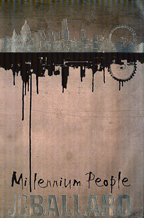 In contrast to this individual attack on licensed transgression Millennium People can be seen as an analysis of the possibility of collective revolt against bourgeois conformity, presented in a comic fashion. The novel’s thesis (which is not treated particularly seriously) is that the middle class are the new proletariat, exploited by the culture industries and their need to maintain an appropriate lifestyle. A revolt breaks out in the enclosed community of Chelsea Marina, which is led by Kay Churchill, a film studies lecturer, and the paediatrician Dr Richard Gould. The central character of the novel is the psychologist David Markham, who is investigating this ‘revolution’ in the hope of finding those responsible for a bomb at Heathrow that killed his ex-wife. The residents of Chelsea marina have ‘set about dismantling their middle-class world’ (2004: 6) by attacking the symbols of their oppression, all the embodiments of aspirant culture: Tate modern, the Natural History Museum, coffee shops, the BBC, and so on. Most amusing for any one familiar with the institution is the arson attack on the National Film Theatre (2004: 117-125). What is evident is that this revolution takes two forms, the open protests led by Kay Churchill and the more violent ‘terrorist’ attacks initiated by Richard Gould. Rather than a social revolution Gould aims to undermine the reference points of contemporary life by attacking meaningless and random targets. As he states ‘[t]here’s a deep need for meaningless action, the more violent the better’ (Ballard, 2004: 249). In contrast to this individual attack on licensed transgression Millennium People can be seen as an analysis of the possibility of collective revolt against bourgeois conformity, presented in a comic fashion. The novel’s thesis (which is not treated particularly seriously) is that the middle class are the new proletariat, exploited by the culture industries and their need to maintain an appropriate lifestyle. A revolt breaks out in the enclosed community of Chelsea Marina, which is led by Kay Churchill, a film studies lecturer, and the paediatrician Dr Richard Gould. The central character of the novel is the psychologist David Markham, who is investigating this ‘revolution’ in the hope of finding those responsible for a bomb at Heathrow that killed his ex-wife. The residents of Chelsea marina have ‘set about dismantling their middle-class world’ (2004: 6) by attacking the symbols of their oppression, all the embodiments of aspirant culture: Tate modern, the Natural History Museum, coffee shops, the BBC, and so on. Most amusing for any one familiar with the institution is the arson attack on the National Film Theatre (2004: 117-125). What is evident is that this revolution takes two forms, the open protests led by Kay Churchill and the more violent ‘terrorist’ attacks initiated by Richard Gould. Rather than a social revolution Gould aims to undermine the reference points of contemporary life by attacking meaningless and random targets. As he states ‘[t]here’s a deep need for meaningless action, the more violent the better’ (Ballard, 2004: 249).In this case the novel is not so much about the violent underside of bourgeois existence but the violent underside of the attempt to overturn that existence. Kay Churchill’s protests make use of violence but this is directed toward political ends, as a kind of bourgeois version of the Cultural Revolution. The eventual fate of this revolt is recuperation, with Kay presenting her views on daytime television and the residents of Chelsea Marina dispersing in the face of State repression. In contrast Richard Gould offers a more disturbing programme of nihilistic protest, ironically in the desire to re-enchant a world that has become meaningless. [2] Although David Markham suspects Stephen Dexter, a renegade priest and associate of Gould, of the murder of his wife the unsurprising revelation is that Gould is responsible. In fact Markham was his real target, because he represents all the smug certainty of the corporate psychologist.  It is certainly true is that in this novel Ballard still portrays violence and crime as, essentially, therapeutic. This time, unlike Super-Cannes, the suggestion is that the middle classes may have access to a form of violence that breaks out of the circuit of violence as controlled pathology. In the case of Markham his break with morality, through crime, leads him into a new existence in which he can recognise the utopian promise left unfulfilled by the Chelsea Marina revolution. The question remains about the possession of this ability as a property of the supposedly immiserated middle classes. While middle-class revolt is treated in a relatively humorous, and tolerant, fashion a working-class revolt is, as we will see, a more disturbing matter for Ballard. It is certainly true is that in this novel Ballard still portrays violence and crime as, essentially, therapeutic. This time, unlike Super-Cannes, the suggestion is that the middle classes may have access to a form of violence that breaks out of the circuit of violence as controlled pathology. In the case of Markham his break with morality, through crime, leads him into a new existence in which he can recognise the utopian promise left unfulfilled by the Chelsea Marina revolution. The question remains about the possession of this ability as a property of the supposedly immiserated middle classes. While middle-class revolt is treated in a relatively humorous, and tolerant, fashion a working-class revolt is, as we will see, a more disturbing matter for Ballard.Kingdom Come (2006) varies the theme of Millennium People to focus on a potential revolution amongst the working class and petit bourgeois inhabitants of the towns that ring London around the M25 motorway. This revolution is presented as the rise of ‘soft’ or ‘consumer’ fascism linked to the reaction to the new large shopping mall of the Metro Centre; fairly transparently modelled on the actual Bluewater shopping mall, which lies off the M25 in Kent. The key signifier of this movement is the cross of St. George, familiar to British readers from its appearance on cars and houses to accompany recent campaigns by the England football team during the World Cup or European Championships. Ballard’s hostility to sport and its associated violence, linked to this imposed patriotism, is unconcealed and salutary considering the endorsement of such patriotism by the British politicians, whether Conservative or Labour. What is more contentious is the coding of the working-class revolt as fascist and the tendency of the novel to support a number of existent media-based critiques of contemporary working-class behaviour. In these discourses consumption is acceptable if it is appropriate ‘tasteful’ and ‘healthy’ middle-class consumption, and threatening if ‘vulgar’ and ‘destructive’ working-class consumption. Ballard then can be regarded as conceding to a patrician, or even reactionary, critique of working-class culture. 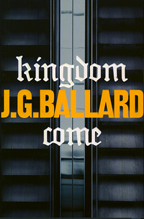 The novel though is somewhat more interesting than this initial criticism would suggest. Again it concerns a crime: the murder of the Richard Pearson’s father during a gun rampage in the Metro Centre. Another investigation ensues in which Pearson slowly uncovers a plot that seems ambiguously poised around harnessing or struggling against this new consumer fascism (this point is left unresolved). Interestingly it is Pearson himself who plays an even more ambiguous role than the central characters of the previous novels when he uses his advertising skills to encourage and tutor the daytime TV actor David Cruise in his role as ‘leader’ of the revolt. When Pearson eventually uncovers the truth of his father’s death he realises this is part of the wider conspiracy to harness consumer fascism of which he is now a part. So much so that when the revolution does break out at the Metro Centre he joins it and refuses opportunities to leave as the centre is besieged by the forces of law and order. Rather like David Markham he is both fascinated observer and actor in the situation that unfolds but rather than the dispersion of the middle-class revolutionaries of Millennium People here we have another vision of the stasis and inertia of the enclosed community, obviously again echoing Ballard’s camp experience. The novel though is somewhat more interesting than this initial criticism would suggest. Again it concerns a crime: the murder of the Richard Pearson’s father during a gun rampage in the Metro Centre. Another investigation ensues in which Pearson slowly uncovers a plot that seems ambiguously poised around harnessing or struggling against this new consumer fascism (this point is left unresolved). Interestingly it is Pearson himself who plays an even more ambiguous role than the central characters of the previous novels when he uses his advertising skills to encourage and tutor the daytime TV actor David Cruise in his role as ‘leader’ of the revolt. When Pearson eventually uncovers the truth of his father’s death he realises this is part of the wider conspiracy to harness consumer fascism of which he is now a part. So much so that when the revolution does break out at the Metro Centre he joins it and refuses opportunities to leave as the centre is besieged by the forces of law and order. Rather like David Markham he is both fascinated observer and actor in the situation that unfolds but rather than the dispersion of the middle-class revolutionaries of Millennium People here we have another vision of the stasis and inertia of the enclosed community, obviously again echoing Ballard’s camp experience.The result is that the energy of this dubious ‘soft’ fascist revolution turns inward into a drifting dream state of the type Ballard has evocatively described throughout his fiction. David Cruise has been left fatally wounded on life support while his followers try to enforce order and start to construct their own consumer religion centred on the three large sculptures of bears that are the symbol of the centre. The novel then seems to depart from an anti-working class snobbery into a wider, and more effective in my opinion, critique of consumer nihilism. Similar to Millennium People we have a rather pessimistic, if perhaps realistic, sense of the ability of the new consumer capitalism to contain political energies, whether they come from the left or the right. All we are left with are temporary ‘carnivals’ in which power is momentarily threatened and, as Terry Eagleton puts it, such events are ‘incorporative as well as liberating, the lifting of inhibitions politically enervating as well as disruptive’ (1981: 149). What Ballard pursues in this novel in the enervative effect. Writing before the publication of this novel Andrzej Gasiorek pointed out that Ballard’s recent fiction is driven by ‘a dynamic of violence’ (2005: 202). For Gasiorek this increasingly nihilistic violence is response to the meaninglessness of contemporary existence and particularly the fragmentation of the subject under the impact of capitalism and technology. Now we appear to witness the stalling of this dynamic and the failure of the nihilist gesture. While a character like Gould, from Millennium People, incarnated a ‘revolt against sociality itself’ (Gasiorek, 2005: 212), in Kingdom Come we have the revenge of that ‘sociality’. This suggests how Ballard is critical of his earlier charting of the dynamics of violence in the form of transgression and its limits (see Noys, 2006). It also suggests that the fiction itself exceeds the theoretical frame which I have erected around it. While Žižek’s analysis illuminates aspects of the themes of the novels Ballard’s fiction also poses questions back to the theory. Certainly it can be argued that Zizek’s work does not provide a set of ‘neutral’ theoretical tools for the analysis of Ballard’s fiction, because Zizek’s own analysis repeats the problem of ‘reactionary libido’. While his intention is to offer a left-wing reading of these problems, and he aggressively positions himself as a Marxist, there is some reason to doubt this claim. [3] Throughout Zizek’s work there runs a certain sympathy for authoritarian ‘strong-men’ as models or examples of those taking up a truly political position: from Lenin and Mao to De Gaulle and Pope John Paul II (see Breger, 2001). In the case of the last figure Zizek approved of the late Pope for his ‘intractable ethical stance’ on many issues and his refusal of the liberal ‘easy way out’ (2005b); although he did also criticise the Pope as an ‘ethical failure’ for his refusal to confront the obscene underside of the Catholic Church – the many paedophile priest scandals. While there is obviously an element of deliberate provocation in these choices, the expression of a desire to break-through what Zizek sees as the complacency of contemporary academic debate, we have already seen how such gestures of provocation and ‘taboo-breaking’ can be highly problematic. A second problem is Zizek’s own engagement with the politics of transgression. He has recognised how his own work seems to endorse a tragic and suicidal politics of transgression, which only offers the nihilistic gesture of destruction (Zizek, 2002c: xii; see also Chiesa, 2006). This is especially true of his definition of the ‘Act’ that would breakout of the obscene superego circuit of law and its transgression. Ernesto Laclau charges that Zizek both dismisses all partial struggles to change the system and fails to provide any concrete actor who could really change the enjoyment that binds communities, which seems to be eternal (2005: 238). The result, Laclau claims, is ‘political nihilism’ (2005: 238), in which we have no obvious reason why we should make one political choice rather than another. Zizek’s alternative is an act that would allow ‘symbolic re-inscription’ rather than the endless cycle of transgression. This means that we can’t simply bring out the obscene underside into the open and then dwell within its nihilistic destructiveness, instead we have to re-inscribe it: ‘to change the underlying set of obscene unwritten rules’, as Zizek puts it (2002a: 32). The conclusion that can be drawn from Kingdom Come is the difficulty of making this sort of change in the absence of any recognisable political actors. Ballard’s novel poses the problem of the inertia of enjoyment and the difficulty in any transformation or evacuation of that enjoyment. If Ballard suggests the difficulty of just that sort of act at the level of the social then we may see it as conceding to reactionary pessimism or, if we prefer, a sober realism. The dystopian warnings he offers are, as he points out in an interview, notably ambiguous: ‘‘I’m somebody who stands by the side of the road with a sign saying, Dangerous Bends Ahead – Slow Down.’ He pauses. ‘Although it is true that I sometimes seem to be saying Dangerous Bends Ahead – Speed Up.’’ (in Brown, 2006: 20). I want to argue that the ‘unwritten rules’ that his recent fiction works upon are not simply the rules of capitalist consumer society but more the rules of genre fiction and the existing constraints of literary production in the UK (and elsewhere). This involves shifting from a concern with plot and themes to the consideration of how these are also interwoven with a critique of literary forms. It is particularly telling that Ballard probes the transgressive gesture within the thriller or crime form, both of which rely on the exploitation of transgression. Although Ballard’s recent novels are organised around the investigation into a crime in each case the element of mystery is often lacking. This is particularly true for the reader of more than one of these novels who soon notes the repeated pattern. In this way Ballard refuses to provide us with the usual enjoyment of the detective form: the process whereby an initial state of disorder is gradually restored to order by the work of the detective. Instead of the focus on a particular crime we witness the gradual emergence of what we could call criminality itself, in the form of organised and licensed transgression. Therefore there is no possibility of a return to order because, as Zizek noted, order itself is a particular form of transgression. These novels are also on the edge of the thriller form, which can be defined as a novel of suspense usually involving political action by groups and individuals. Although the thriller is part of genre fiction it has a relatively high-status, certainly compared to science fiction or horror. Writers like John le Carré and Thomas Harris have made it an acceptable bourgeois genre, perhaps even the bourgeois genre. [4] There are examples of liberal or left wing thrillers, such as Le Carré’s The Constant Gardner (2000), but the politics of the genre have tended to be highly reactionary. They tend to reinforce an admiration for the ‘dirty work’ needed to stabilise the political order as the hero – and it is usually a hero – acts outside the public law for the sake of preserving that law. Ballard’s turn to the thriller form could be regarded as an intervention in itself, subverting this form by opening it to the radical effects of political re-inscription. The destructive endings of his works not only play out the logic of transgression in social or political terms, they also it play out in literary and genre terms. They rupture the political closure of the thriller, whether that closure belongs to the left or right, not through a political prescription but through the radical suspension of the usual libidinal investments in politics. In this way we could also argue that his interrogation of what passes for politics is also an interrogation of what passes for fiction. Ballard takes up many of the elements of the thriller and crime fiction, in particular the political thriller, but brings them not to the resolution of a climax but rather to a kind of fading. In the novels Cocaine Nights, Super-Cannes, and Millennium People, we find that rather than galvanising a group around a political task these works engage with the waning of affect that prevents engagement. Also they probe the very nature of what is means to be galvanised, what enjoyment it takes to bind us to a project and the nature of that enjoyment. The repetition of characters, structures, and thematic elements, all suggest that these works cannot be read satisfactorily as thrillers or crime novels. As he did with science fiction Ballard reworks existing elements of a genre to produce a new form of work. In this case he produces the ‘thriller’ as roman a thèse, but with a ‘thesis’ that is essentially an ambiguous analysis of future psychopathologies and so lacking the didactic security of a fixed political position. Therefore we can give some substance to John Gray’s comment by suggesting that this lack of a political position certainly does not mean that lack of any politics, quite the contrary. This is particularly true of Kingdom Come and this perhaps accounts for some of the dissatisfaction with which reviewers greeted the novel. The usual category of an opposition between competing groups that often characterises the thriller breaks down into ambiguity as it becomes virtually impossible to grasp whether characters are struggling against the fascist ‘revolution’, trying to control it, or tacitly or explicitly supporting it. The previous dynamic of violence that made his previous novels accessible in thriller terms has explicitly exhausted itself in a return to the kind of ‘terminal’ fictions Ballard had previously produced (an early short story by Ballard was called ‘The Terminal Beach’ [1964]). Rather than any endorsement of potentially reactionary violence, or even of fascism, we find a careful consideration of the exhaustion of the transgressive gesture. What we also find, if we shift away from the fascination exerted by the content of his novels, is the politics of a disruption of form. It is in this second gesture of clearing away that a radical, and disturbing, political question can be found – how are we to rebel? Michel Delville remarks that one of the most important effects of Ballard’s work is that it ‘acts as a forum for contemporary debates about regression, sexual deviance and the role of violence and radicalism in the arts’ (1998: 6). I would agree, and this is precisely the use I have made of his work. What is striking is how, unlike the new reactionaries debate in France, his work has not usually acted in such a fashion in Britain. The forum has, largely, remained empty and the ‘debate’ has not taken place in any substantial way. How do we explain this fact? If Ballard’s recent novels explore the problem of licensed transgression then it is also worth reflecting on how this also defines his own position as a writer in the contemporary British media public sphere. Which is to say that since his movement out of science fiction, with his autobiographical works and the turn to the thriller form, Ballard has become an accepted figure in the British literary ‘scene’. The cost of this acceptance is that he has become figured as the licensed eccentric who can be guaranteed to offer up the provocative opinion, and his fictions generate a certain amount of ‘safe’ controversy. While his work is recognised as provocative and controversial this is neutralised through the construction of an ‘eccentric’ authorial persona. 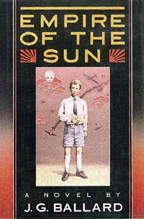 One way in which this is carried out is through a biographical reductionism. As I remarked the publication of The Empire of the Sun (1984) offered a number of biographical keys that seemed to explain the thematics of his oeuvre. Although I would certainly not deny the possibility of exploring these links they have often been used to deny the implications of his fiction and, especially, his experiments with form. As Iain Sinclair states, Ballard’s fictional autobiography allowed ‘the humanising of a profoundly misanthropic oeuvre that had never been contained in genre reservations’ (1999: 18). This was particularly true of the second volume of his fictionalised autobiography, The Kindness of Women (1991), in which Ballard himself lent credence to the explanation of his experimental fiction as being a result of the ‘madness’ of the 1960s. One way in which this is carried out is through a biographical reductionism. As I remarked the publication of The Empire of the Sun (1984) offered a number of biographical keys that seemed to explain the thematics of his oeuvre. Although I would certainly not deny the possibility of exploring these links they have often been used to deny the implications of his fiction and, especially, his experiments with form. As Iain Sinclair states, Ballard’s fictional autobiography allowed ‘the humanising of a profoundly misanthropic oeuvre that had never been contained in genre reservations’ (1999: 18). This was particularly true of the second volume of his fictionalised autobiography, The Kindness of Women (1991), in which Ballard himself lent credence to the explanation of his experimental fiction as being a result of the ‘madness’ of the 1960s.The ‘humanising’ gesture could also trace Ballard’s experimentalism back to a personal pathology, as a result of wartime trauma. This is what would then make him ‘vulnerable’ to the supposed ‘excesses’ of 1960s experimentalism. To perform such a reduction would allow Ballard to be assimilated to the contemporary cultural obsession with the traumatised childhood as the source of all ills, and in this case a trauma that happened elsewhere (and in wartime). A recent trip to a major UK high street bookseller revealed a new genre classification: ‘tragic lives’. Such a positioning reinforces the image of Ballard as a licensed eccentric to ‘mainstream’ British culture, whether that position is celebrated or used as grounds for condemnation. I’m not arguing that Ballard should embody some sort of avant-garde purity, or that he should avoid the autobiographical. Instead it is more of a matter of the constriction of the terms of literary and cultural debate in Britain. This is ironic in that Ballard’s whole career has been a protest against these constrictions. He has drawn on sources which have only led a subterranean existence in British culture: surrealism, experimental modernism, and science fiction. He has also deployed these resources in opposition to the mainstream constraints of middle and highbrow bourgeois fiction (see Gasiorek, 2005: 3). This revolt has not gone unheeded but the ‘repressive tolerance’ of British cultural life means that acceptance often comes at the cost on a neutralisation or minimisation of the urgent concerns Ballard raises. Against this I am arguing for the need to critically engage in debate with those concerns – precisely at the level of form as well as content. Of course the fiercely polemical debate that has characterised the new reactionaries dispute in France can also be seen as an avoidance of the problematic issues raised by writers like Dantec and Houellebecq. There is no simple solution to these problems, as Ballard’s own fiction suggests. Without engagement though we risk leaving the future to competing systems of psychopathology. Ben Noys has a revised version of his article on Baudrillard/Ballard in the January 2008 issue of the online journal: International Journal of Baudrillard Studies. Notes [1] Ballard’s 1969 essay ‘Alphabets of Unreason’, on Hitler’s Mein Kampf, is another ambiguous example of an analysis of the fascination exerted by the ‘psychopathic’ authority figure (1997b: 221-223). [2] Andrzej Gasiorek correctly notes the link between Gould’s nihilistic terrorism and the Professor in Conrad’s The Secret Agent (2005: 212). [3] See Ian Parker’s Slavoj Zˇizˇek: A Critical Introduction (2004) for a rebuttal of the identification of Žižek as a Marxist. [4] In a 1982 interview Ballard dismisses Le Carré as a middlebrow writer of ‘terrible thrillers’ (1984: 6). References Ballard, J. G. (1977) [1975] High Rise. London: Triad Panther. Ballard, J. G. (1984) ‘Interview with A. Juno and Vale’, Re/Search 8/9 JG Ballard special issue: 6-35. Ballard, J. G. (1988) Running Wild. London: Hutchinson. Ballard, J. G. (1995) [1994] Rushing to Paradise. London: Flamingo. Ballard, J. G. (1997a) [1996] Cocaine Nights. London: Flamingo. Ballard, J. G. (1997b) A User’s Guide to the Millennium. London: Flamingo. Ballard, J. G. (2001) [2000] Super-Cannes. London: Flamingo. Ballard, J. G. (2004) [2003] Millennium People. London: Harper Perennial. Ballard, J. G. (2005) ‘Now Parliament is Just Another Hypermarket’, New Statesman 9 May 2005: 28-9. Ballard, J. G. (2006) Kingdom Come. London: Fourth Estate. Breger, C. (2001) ‘The Leader’s Two Bodies: Slavoj Žižek’s Postmodern Political Theology’, Diacritics 31.1 (Spring 2001): 73-90. Brown, M. (2006) ‘From Here to Dystopia: Interview with J. G. Ballard’, Telegraph Magazine 2 September: 16-22. Chiesa, L. (2006) ‘Tragic Transgression and Symbolic Re-inscription: Lacan with Lars Von Trier’, Angelaki 11.2: 49-62. Delville, M. (1998) J. G. Ballard. Portsmouth: Northcote House. Eagleton, T. (1981) Walter Benjamin, or Towards a Revolutionary Criticism. London and New York: Verso. Gasiorek, A. (2005) J. G. Ballard. Manchester and New York: Manchester University Press. Gray, J. (1999) ‘Modernity and its discontents’, New Statesman http://www.newstatesman.com/199905100041. Laclau, E. (2005) On Populist Reason. London and New York: Verso. Lindenberg, D. (2002) Le rappel à l’ordre: Enquête sur les nouveaux réactionnaires. Paris: Éditions du Seuil. Noys, B. (2006) ‘Crimes of the Near Future: Baudrillard / Ballard’, Ícone 9: 29-38. Parker, I. (2004) Slavoj Žižek: A Critical Introduction. London and Sterling, Virginia: Pluto Press. Sinclair, I. (1999) Crash. London: BFI Publications. Zizek, S. (2002a) Welcome to the Desert of the Real!. London and New York: Verso. Zizek, S. (2002b) ‘“You may!”’ (1999), in Bran Nicol (ed.) Postmodernism and the Contemporary Novel: A Reader, pp.121-129. Edinburgh: Edinburgh University Press. Zizek, S. (2002c) For They Know Not What They Do: Enjoyment as a Political Factor, 2nd Edition. London and New York: Verso. Zizek, S. (2005a) ‘Concesso Non Dato’, in G. Boucher, J. Glynos and M. Sharpe (eds.) Traversing the Fantasy: Critical Responses to Slavoj Zizek, pp. 219-255. Aldershot and Burlington: Ashgate. Zizek, S. (2005b) ‘The Pope’s Failures’. In These Times (consulted September 2005): http://www.inthesetimes.com/site/main/article/2059/. Zizek, S. (2006) How to Read Lacan. London: Granta. |
||